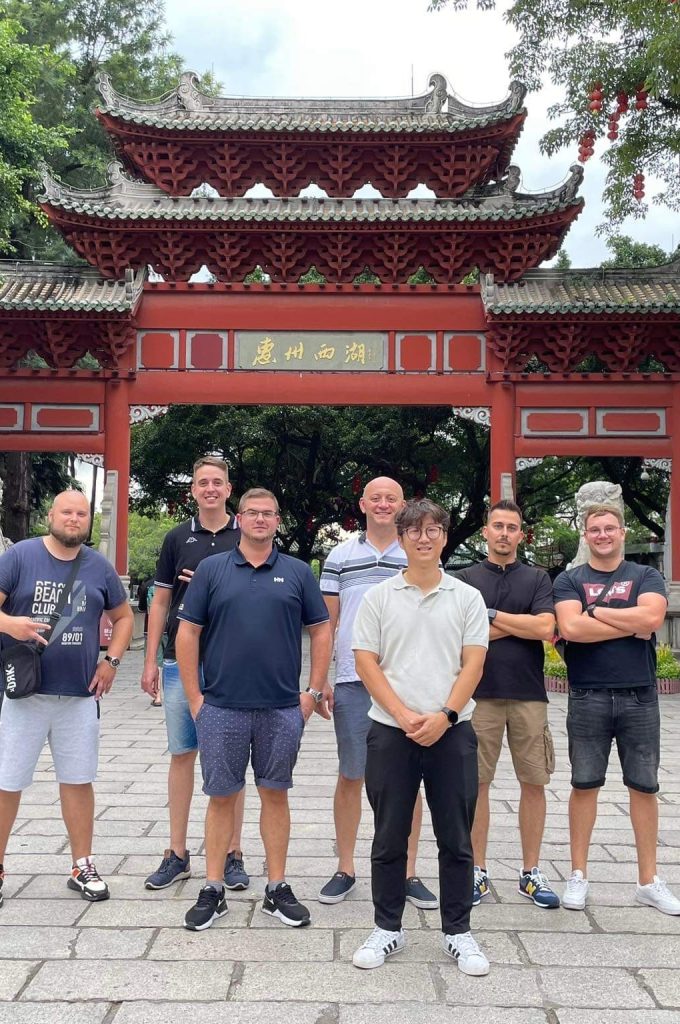INTERVIEW- LEVENTE SZABÓ
Last year a small delegation from our company visited a battery factory based in China, but mostly owned by Koreans. The Hungarian group included Levente Szabó, an engineer from SKBM Assembly, who had a memorable nine days in the Far Eastern battery factory. Below, Levente tells us about his interesting and valuable experience of his visit to China.
Could you please summarise in a few words how long you have been working at SK and what exactly is your responsibility?
I’ve been working at SKBM Assembly since February 2021, so it’s been almost three years now. I started as a junior engineer, but now “junior” has been dropped from my title. Initially, I was only responsible for one production line, which then expanded to several lines, giving me a comprehensive view and experience of everything from notching to packaging. Of course, you also get to do a lot of other things, as it’s a very complex job.
You were recently part of a Hungarian SK team that paid a several-day visit to a battery factory in China.
Yes, I’m very happy to have been given the opportunity, not only because of what I said before, that I’ve been working here for a while, but also because my superiors saw that I had enough experience. I understand that this was one of the decisive factors in the selection of the team, as the expatriate guard was also filled with experienced colleagues from other areas.
Where exactly did you go?
For nine days, we travelled to EVE Power in China and SK Innovation, a joint battery manufacturing company called EUE. The factory where we stayed had four lines in operation, while the newer one had five. Their first partner was Daimler, followed by Hyundai, and soon they will be producing for Xpeng in China. Their total production capacity is up to 20GWh.
What exactly did your stay consist of?
The day we arrived was basically about acclimatisation, so the second day was all about introductions, company presentations and a visit to their test centre. The following days were dedicated to the production technology and the different phases of the production process itself, such as electrode, assembly, moulding and quality. They had no module. All questions were answered very willingly and accurately. In the meantime, as I mentioned before, they showed me the production process and how it is done.
What was the main purpose of the visit?
Gaining experience and comparing our factory with theirs to see how we could improve. I would say that it is mainly us, since their factory started almost at the same time as SK On Hungary’s first factory. It was obvious that they were ahead of the game, so we wanted to learn some good practices, and of course networking was not a minor factor. It’s worth noting that they had been here before, when they were the only ones running a line for a while. Of course, it was not only about professional things, but also about getting to know each other’s culture a little, as they are planning to build a factory in Debrecen.
For you, what were the biggest differences from a technical point of view compared to the conditions here?
The improvements because they are very open to these things. Also, the processes are much simpler and streamlined. In PPT, for example, they use photos to illustrate a much smaller number of pages, which are of course supported by figures. On the other hand, the Chinese have practically grown into work, so what they do is also a matter of honour for them. They are also terribly concerned about cleanliness.
So, in their case, the work-life balance is clearly tilted towards work?
Yes. This is also illustrated by the fact that they don’t really have company buses or cars, but ten-storey apartment blocks lined up next to the factory, on the other street. It was also interesting to note that they have a multi-rate tax system, and that an operator, for example, earns the same as in Hungary, but the difference is that in China you can buy cheaper in the shops, which does not, contrary to popular belief, come at the expense of quality.
Beyond technology, what other company-related experience have you gained?
Their dining room was simply amazing, in size, cleanliness and modernity. Everyone from operators, technicians and decision makers ate there. It probably goes without saying that the food on offer, which was part of the allowance, was very varied. What was also interesting for us was that the company had a separate childcare section.
How much have security measures (e.g. access to/exit from the factory) been new to you?
The taping of the phones is done in the same way as in our country, but with the added bonus of fingerprinting and facial recognition cameras to approve the door opening. This system doesn’t even let you pass until you look into the camera.
Overall, what are your personal conclusions?
I was very positively disappointed. They were very nice, open and helpful to us. Not just the people working in the factory, but people we met outside the company in our everyday lives, shopping or walking around. Everyone was terribly open to us.


